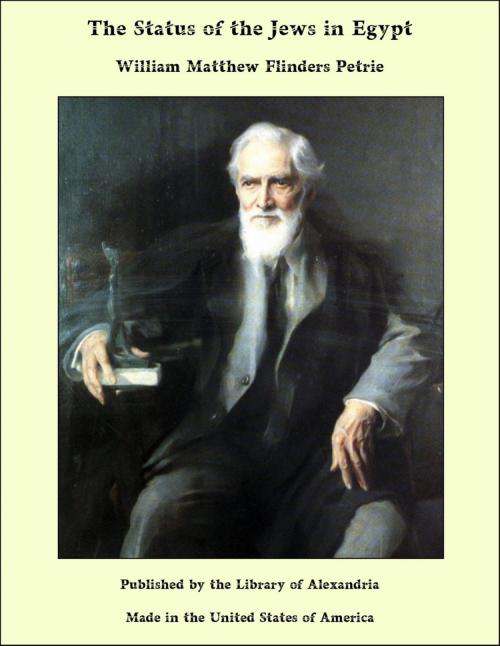The Status of the Jews in Egypt
Nonfiction, Religion & Spirituality, New Age, History, Fiction & Literature| Author: | William Matthew Flinders Petrie | ISBN: | 9781465618368 |
| Publisher: | Library of Alexandria | Publication: | March 8, 2015 |
| Imprint: | Language: | English |
| Author: | William Matthew Flinders Petrie |
| ISBN: | 9781465618368 |
| Publisher: | Library of Alexandria |
| Publication: | March 8, 2015 |
| Imprint: | |
| Language: | English |
In considering the history of any people, one of the main elements is that of their status. What were their abilities and how were they shown? What permanent mark did they make on their period? How did they stand in reference to their neighbours, in the same country and in other countries? There are now Jews in Lemberg and Jews in Paris; but how entirely differently we regard them, because of their status. How utterly diverse is the mark left on the world by the men of mind, by Isaiah or Aristotle, compared with the energies of patriots, like the Maccabees or Sulla. Mere existence matters nothing to the present or the future; it is the energizing influence of fresh thoughts or organization that alone gives value to any people. Various races at present who think a great deal of themselves have never added a single idea or capability to the rest of the world, their status is simply that of incapable dependence upon the civilization of others. Regarding then the dominant importance of status, it seemed that it would be useful to focus together the various fragments of views that have been gained as to the position occupied by the Jewish race in Egypt at different periods. We may glance first at the earlier relations of Semites with Egypt. The second prehistoric civilization was of Eastern origin; and judging by the strong analogies of the Egyptian language with Semitic speech, it seems probable that this prehistoric age was dominated by a race which later developed into the historic Semites.
In considering the history of any people, one of the main elements is that of their status. What were their abilities and how were they shown? What permanent mark did they make on their period? How did they stand in reference to their neighbours, in the same country and in other countries? There are now Jews in Lemberg and Jews in Paris; but how entirely differently we regard them, because of their status. How utterly diverse is the mark left on the world by the men of mind, by Isaiah or Aristotle, compared with the energies of patriots, like the Maccabees or Sulla. Mere existence matters nothing to the present or the future; it is the energizing influence of fresh thoughts or organization that alone gives value to any people. Various races at present who think a great deal of themselves have never added a single idea or capability to the rest of the world, their status is simply that of incapable dependence upon the civilization of others. Regarding then the dominant importance of status, it seemed that it would be useful to focus together the various fragments of views that have been gained as to the position occupied by the Jewish race in Egypt at different periods. We may glance first at the earlier relations of Semites with Egypt. The second prehistoric civilization was of Eastern origin; and judging by the strong analogies of the Egyptian language with Semitic speech, it seems probable that this prehistoric age was dominated by a race which later developed into the historic Semites.















